|
|
|
Sort Order |
|
|
|
Items / Page
|
|
|
|
|
|
|
| Srl | Item |
| 1 |
ID:
178126
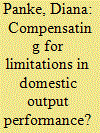

|
|
|
|
|
| Summary/Abstract |
Cooperation in regional international organizations (RIOs) can help member states to work toward and perhaps achieve policy goals that would not be feasible unilaterally. Thus, RIOs might be used as a means of states to compensate for domestic shortcomings in output performance. Do states equip RIOs with policy competencies in order to compensate corresponding domestic performance shortcomings? The analysis of a novel database on policy competencies of 76 RIOs between 1945 and 2015 reveals that usually RIOs are not usually used as window-dressing devices by which states disguise limited domestic output performance. Instead, governments tend to equip RIOs with policy competencies in order to further strengthen their already good output performance in most policy areas. However, in the policy area, ‘energy’ states tend to confer more competencies to their respective RIOs, the worse they perform domestically, indicating that output-related compensation dynamics might be at play in this field.
|
|
|
|
|
|
|
|
|
|
|
|
|
|
|
|
| 2 |
ID:
091919
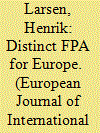

|
|
|
|
|
| Publication |
2009.
|
| Summary/Abstract |
In the existing literature, the need for a distinctive approach to the analysis of foreign policy in Europe is usually seen as a uniform requirement applying across policy areas. At the same time, the criteria for judging the need for a new approach are underspecified. The article puts forward the argument that the approach to analysis of the national foreign policies of EU member states ought to vary according to the policy area under study. On the basis of an empirical study of Danish foreign policy, the article presents a comprehensive framework for the analysis of national foreign policy in an EU context which takes account of differing issue areas. The framework includes three analytical lenses: traditional FPA, transformed FPA and postmodern FPA. These lenses are derived from the strength of the EU policy and the national understandings of agency in the area concerned
|
|
|
|
|
|
|
|
|
|
|
|
|
|
|
|
| 3 |
ID:
093893
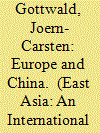

|
|
|
|
|
| Publication |
2010.
|
| Summary/Abstract |
Relations between the People's Republic of China and the European Union have matured significantly. While the European Commission is actively promoting an EU China policy, the influence of the member states continues to be a defining element. In this regard, most studies and political comments call for greater coherence in European China policies. Looking at recent debates and programmes in five member states, the paper identifies three trends: programmatic convergence, the politicisation of bilateral relations within member states and an increasing assertiveness towards the PRC.
|
|
|
|
|
|
|
|
|
|
|
|
|
|
|
|
| 4 |
ID:
146186
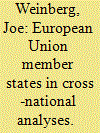

|
|
|
|
|
| Summary/Abstract |
Many empirical models make assumptions about the primacy of domestic politics that fail to accommodate new trends in supranational policy making. Scholars now acknowledge that national political decisions often depend on other countries, international institutions, or global economic conditions. More interestingly, many sovereign countries have either lost or purposely delegated away policy autonomy to supranational institutions. For example, fixed exchange rates, regional trade agreements, and transnational regulations create the distinct possibility that domestic politics no longer provide a sufficient explanation for many policy outcomes. In some respects, two types of countries now exist: those that retain decision-making authority over a given policy space and those that do not. Combining both types of countries into a larger cross-national sample may generate flawed substantive results and fails to adequately test hypotheses. I use the example of European Union (EU) governance over trade policy to demonstrate the empirical dangers of disregarding differences in policy autonomy among countries.
|
|
|
|
|
|
|
|
|
|
|
|
|
|
|
|
| 5 |
ID:
148305
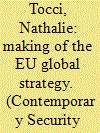

|
|
|
|
|
| Summary/Abstract |
This article traces the evolution of the EU strategic reflection which culminated in the publication of the EU Global Strategy (EUGS) in June 2016. It explains the choices made by EU High Representative Federica Mogherini over this time period—including both the initial strategic assessment and the final EUGS. It provides a behind the scenes view on the players, the organization and the methods of work used to produce a strategic vision for the EU’s role in the world.
|
|
|
|
|
|
|
|
|
|
|
|
|
|
|
|
| 6 |
ID:
190057
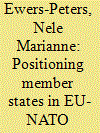

|
|
|
|
|
| Summary/Abstract |
With the growing density and the plethora of security organisations on the regional and international level, the research programme on interorganisational relations has received increasing scholarly attention. The complexity of European security – in light of the Ukraine conflict since 2014, Russia’s more assertive foreign policy behaviour, and on-going crisis management operations in the Africa, the Mediterranean Sea and Middle East – has revived EU-NATO cooperation. The analysis from the perspective of member states and how they can be positioned in the EU-NATO interorganisational relations, however, has received little exploration. This article, therefore, addresses the roles and positions of member states within the relations between the EU and NATO as Europe’s prime security organisations. Member states have numerous political strategies at their disposal to trigger, strengthen or obstruct interorganisational relations, ranging from forum-shopping to hostage-taking and brokering. Drawing on insights from regime theory, network analysis, organisation theory and interorganisationalism, this article proposes a typology of member states in EU-NATO cooperation. Against the backdrop of this special relationship, the typology is developed which aims to detect and illustrate member states’ positions and strategies.
|
|
|
|
|
|
|
|
|
|
|
|
|
|
|
|
| 7 |
ID:
184038
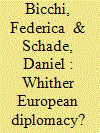

|
|
|
|
|
| Summary/Abstract |
The article analyses the evolution of European diplomacy over two decades, to assess the impact of the European External Action Service (EEAS) creation alongside consecutive waves of enlargement. Data is drawn from two original datasets about European Union (EU) member states’ diplomatic representations within the EU and across the globe. It shows that member states have maintained and strengthened their substantial diplomatic footprint across the EU’s territory, expanding it to include new members and making Brussels a diplomatic hub also for non-member countries. In parallel, and despite the establishment of the EEAS, member states have maintained and even increased their networks of diplomatic representations across the globe, alongside more numerous and more politically active EU Delegations (EUDs). At the same time, member states have been reducing their diplomats’ numbers, as the cases of Austria, France, Germany and Italy show. This delicate balancing act has been made possible not only by contemporary technological developments, but also by European cooperation, as in the case of EUDs hosting member states’ representations in non-member countries, a development referred to as co-location. Therefore, whereas the continued presence of national embassies on the ground could be interpreted as detracting from the EEAS, the existence of EUDs contributes also to other, more indirect but certainly novel, forms of diplomatic cooperation under a single European roof.
|
|
|
|
|
|
|
|
|
|
|
|
|
|
|
|
|
|
|
|
|